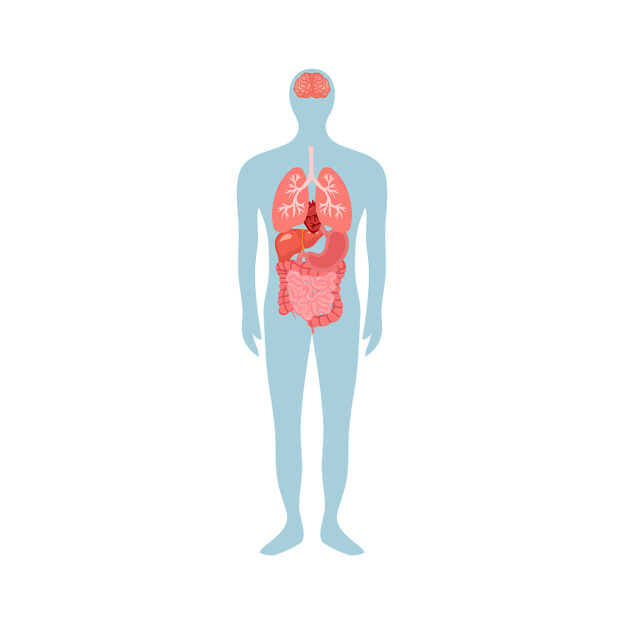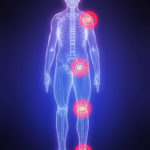By David Blyweiss, M.D., Advanced Natural Wellness
December 31, 2021
Everybody knows that when a wound turns hot, red and weepy, it’s inflamed. When you pull a muscle and it starts aching and throbbing, it’s inflamed. It’s usually easy to see or feel.
We call this acute inflammation. Most times it comes on quickly, but only lasts a short while. It’s a good thing.
When we’re talking about chronic inflammation, it’s an entirely different story. You don’t have to have an injury or infection. The immune system just goes into overdrive for any variety of reasons. Stress, poor diet, bad sleep habits, obesity and so many other things can contribute to it.
For months… for years… the body can send out chemicals that protect our bodies in the short term, but start damaging it in the long term. Because all of those inflammatory cells don’t have a target, they end up in your bloodstream circulating around in your body.
Once this happens, things start changing inside your body.
Take your blood vessels. As inflammatory cells circulate through your bloodstream, they promote plaque buildup. The more plaque you build, the more inflammatory cells run to the rescue, and this makes the plaque build even further.
MD Exposes the Hidden Danger to Your Eyes

When your eyesight starts to fail, it's a real problem. Suddenly you can't go to the grocery store... you can't get to the doctor if you have an emergency... you can't meet your friends for dinner…
Your "regular" doctor doesn't have time to keep up with the latest research. And the same goes for eye doctors. They go to school to learn how to fit you for glasses and contacts, but have no way of preventing the damage and loss of eyesight that threatens your freedom and independence.
Let me show you something that explains a LOT about how your eyes work.
In my FREE Special Report, I'll show you a HUGE, untapped resource for your eyes that safely and naturally restores clear, effortless eyesight.
Click here to get started...
This constant state of emergency inside your body can end up attacking healthy tissue, your joints, and organs like your heart, brain and gut. You won’t feel or see the signs of inflammation until the damage is done. So it’s important to start preventive measures long before symptoms occur.
The first thing you can do is take a look at the foods you’re eating.
Foods that Trigger Inflammation
Whole grains aren’t all they’re cracked up to be. The grains these days aren’t anything like they used to be. They’ve been scientifically engineered and hybridized to the point where they’re no longer recognizable from the grains our ancestors ate. They are inherently inflammatory and I don’t recommend them. You can learn more about whole grains here.
If you choose to eat grains, amaranth, buckwheat, and bulgur are some of your best choices if you want to slash inflammation.
Dairy is not the healthiest source of calcium in your diet. Your body was designed to quit digesting milk somewhere between the ages of two and five. As a result, all of those undigested sugars end up fermenting in your colon where they create a state of chronic inflammation. Plus, commercial dairy products are full of drugs, hormones and antibiotics that can easily provoke an inflammatory response.
So it’s a good idea to limit dairy intake. If you’re concerned about your calcium intake, broccoli, kale, turnip greens and arugula all have high a high calcium content, too.
Farm-raised fish exposes you to all sorts of inflammatory compounds. The most common are polychlorinated biphenyls, which have a direct link to obesity and diabetes. I always recommend buying wild-caught.
Commercially raised red meat is laced with all kinds of hormones, antibiotics and other chemicals, and raised on GMO feed. It raises your levels of at levels of several inflammatory markers, including C-reactive protein (CRP), and interleukin-6 (IL-6) and trimethylamine N-oxide (TMAO). None of these is good for you. They’re linked to heart disease, cancer, Alzheimer’s and other inflammatory diseases. That’s why I always recommend limiting your meat consumption and sticking with grass-fed.
Inflammatory omega-6 fatty acids compete with inflammation-fighting omega-3s to take up space in your tissue. And when they outnumber omega-3s the consequences can be devastating – promoting heart disease, cancer, osteoporosis, autoimmune disease and premature aging. Most vegetable oils and packaged foods are chock full of omega-6 fatty acids.
Are You Suffering From...
- Love handles and a pot belly
- Romance that isn't what it used to
- Forgetfulness and inattention
- Low (or no) strength and endurance
- A sex drive that's shifted into neutral...or worse
If so...you may have Mature Male Burnout. Click here to discover more about this unique condition and what you can do about it.
Food that’s been processed, fried, packaged and loaded with sugar, fructose, salt, artificial sweeteners and GMO ingredients contribute largely to inflammation. This includes soft drinks. These foods and beverages are bad news all the way around.
Other Sources of Inflammation
Stress produces inflammation. And we forget about all of the stress seniors go through. Their adult kids are having a hard time, the grand kids are having a rough time. And now they’re having great-grandchildren. I just saw a patient of mine the other day who can’t sleep at night because all she does is worry about her children.
Deep breathing exercises, meditation and getting a good night’s sleep are three things you can immediately start doing to help reduce your stress levels. Acupuncture and massage therapy are also great stress relievers.
I like programs like yoga and tai chi, too. They not only promote physical health; they also include breathing techniques and meditation to help you de-stress and gain mental clarity. This type of mind-body connection can help lower inflammatory markers and reduce the damaging health effects of stress.
A lack of good quality sleep also leads to inflammation and disease. And of course, when you’re stressed, it’s hard to sleep.
It might be helpful to try certain supplements that can help relax your body and calm your mind.
L-theanine is relaxing and works well for a racing mind. I recommend 200 mg. shortly before bedtime to help calm your mind.
Gamma amino butyric acid – or GABA for short – is a natural relaxant that reduces anxiety. It soothes frazzled nerve cells and muffles neuronal activity in the brain to stop “brain chatter”. You can take 100 to 200 mg. before bedtime.
I also like a combination of curcumin, ashwagandha and rhodiola. Curcumin is a powerful anti-inflammatory, while the other two are adaptogenic herbs that lower stress levels and help you sleep better. Look for a supplement that has 95% curcuminoids and make sure it includes black pepper extract to increase absorption.
And don’t forget to get plenty of physical activity. The more active you are, the more tired you will be at the end of the day.
SOURCES:
Raggi P, Genest J, Giles JT, Rayner KJ, Dwivedi G, Beanlands RS, Gupta M. Role of inflammation in the pathogenesis of atherosclerosis and therapeutic interventions. Atherosclerosis. 2018 Sep;276:98-108.
Pahwa R, Goyal A, Bansal P, et al. Chronic Inflammation. [Updated 2020 Nov 20]. In: StatPearls [Internet]. Treasure Island (FL): StatPearls Publishing; 2021 Jan.
Santos S, Oliveira A, Casal S, Lopes C. Saturated fatty acids intake in relation to C-reactive protein, adiponectin, and leptin: a population-based study. Nutrition. 2013 Jun;29(6):892-7.
Liu Y, Dai M. Trimethylamine N-Oxide Generated by the Gut Microbiota Is Associated with Vascular Inflammation: New Insights into Atherosclerosis. Mediators Inflamm. 2020;2020:4634172.
Liu YZ, Wang YX, Jiang CL. Inflammation: The Common Pathway of Stress-Related Diseases. Front Hum Neurosci. 2017;11:316.
Djalilova DM, Schulz PS, Berger AM, Case AJ, Kupzyk KA, Ross AC. Impact of Yoga on Inflammatory Biomarkers: A Systematic Review. Biol Res Nurs. 2019 Mar;21(2):198-209.
Mullington JM, Simpson NS, Meier-Ewert HK, Haack M. Sleep loss and inflammation. Best Pract Res Clin Endocrinol Metab. 2010;24(5):775-784.







